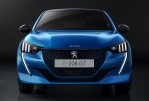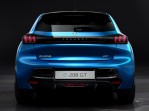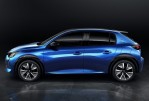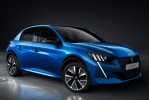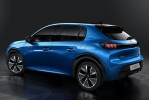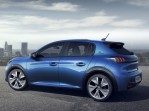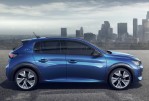Body style: Hatchback
Segment: Compact
Infotainment: ![]() Apple CarPlay
Apple CarPlay ![]() Android Auto
Android Auto
Production years: 2019, 2020, 2021, 2022, 2023
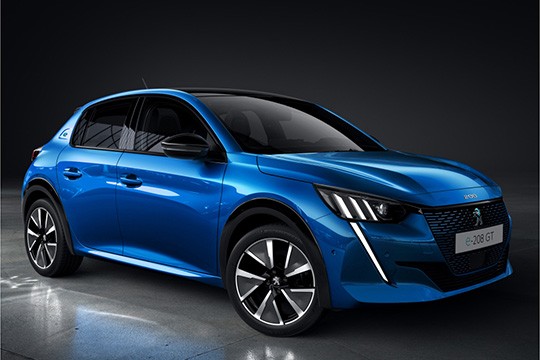 14 Photos
14 PhotosPeugeot introduced the second generation of its 208 B-segment hatchback in 2019, and besides the internal combustion engines' powered versions, it also brought an electric version, joining the movement for zero-emission vehicles.
Peugeot was not new to the electrification game since it already offered an electric version for the 1995 106, named Electrique. Even though it sold that model in just a little over 6,000 units in a few European countries, it was a start. But that model was mostly sold to help the carmaker's engineers understand what to do and how to develop an electric vehicle that could sell in big numbers. Thanks to new technologies and the evolution of the batteries, the e-208 had a much longer range than the previous 106 Electrique and better performance as well.
From the outside, the electron-powered version of the 208 didn't differ too much from its ICE-powered sibling. At the front, the car featured LED lights as standard that increased energy efficiency. The headlights flanked a grille that was mainly blocked since EVs didn't need a broad cooling area, unlike ICE-powered vehicles. In addition, the lower bumper was smoother and stripped from fog lights. Peugeot tried to maximize efficiency and installed aerodynamically studied alloy wheels, which featured blocked areas to minimize drag. In addition, it offered the vehicle with a set of low-resisting rolling tires. On the C-pillar, the automaker added the "e" badge just above the charging port on the left side of the vehicle. Finally, at the back, the B-segment hatchback featured LED taillights, with the specific Peugeot design featuring three vertical bars on each side.
Inside, the French automaker fitted the e-208 with technology, starting with the digital instrument cluster. In addition, a touchscreen filled the area above the center stack in a free-floating position. Fortunately, Peugeot left the turning knob in place for the volume, unlike other automakers that replaced it with touch-buttons that were difficult to use while driving. At the front, both passengers sat on bolstered seats, which were comfortable and made with some recycled materials. In the back, the split-folding bench could accommodate two occupants on long journeys or three for short jaunts. Since the automaker installed the battery pack under the rear bench seat and trunk floor, the luggage compartment was small but big enough for daily use.
Peugeot chose a 100 kW motor to power the little e-208, and the car was no slouch. It could reach 62 mph (100 kph) from a standstill in just a tick over eight seconds on its way to a capped top speed of 150 kph (93 mph). As for the range, the 50 kWh battery enabled the vehicle to run up to 340 km (211 miles) on a single charge.
PEUGEOT e-208 2019, 2020, 2021, 2022, 2023
- 50 KWh 1AT FWD (136 HP)
PEUGEOT e-208
50 KWh 1AT FWD (136 HP)
ENGINE SPECS - 50 KWh 1AT FWD (136 HP) | |
|---|---|
| Electrical motor power: | 100 kw (136 hp) |
| Electrical motor torque: | 191.8 lb-ft (260 Nm) |
| Total maximum power: | 100 kw (136 hp) |
| Total maximum torque: | 191.8 lb-ft (260 Nm) |
| Fuel System: | Electric |
| Fuel: | Electric |
PERFORMANCE SPECS | |
|---|---|
| Top speed (electrical): | 93 mph (150 km/h) |
| Acceleration 0-62 Mph (0-100 kph): | 8.1 s |
TRANSMISSION SPECS | |
|---|---|
| Drive Type: | Front Wheel Drive |
| Gearbox: | 1-speed automatic |
BRAKES SPECS | |
|---|---|
| Front: | Ventilated Discs |
| Rear: | Discs |
TIRES SPECS | |
|---|---|
| Tire Size: | 195/55 R16 |
DIMENSIONS | |
|---|---|
| Length: | 159.6 in (4054 mm) |
| Width: | 68.7 in (1745 mm) |
| Height: | 56.3 in (1430 mm) |
| Front/rear Track: | 59.1/59.1 in (1,501/1,501 mm) |
| Wheelbase: | 100 in (2540 mm) |
| Cargo Volume: | 9.4 cuFT (266 L) |
| Turning circle: | 34.1 ft (10.4 m) |
WEIGHT SPECS | |
|---|---|
| Unladen Weight: | 3208 lbs (1455 kg) |
| Gross Weight Limit: | 4211 lbs (1910 kg) |
POWER SYSTEM SPECS | |
|---|---|
| Power pack: | Lithium-Ion |
| Nominal Capacity: | 46 kWh |
| Maximum Capacity: | 50 kWh |
| Range: | 211.3 miles (340.1 km) |

